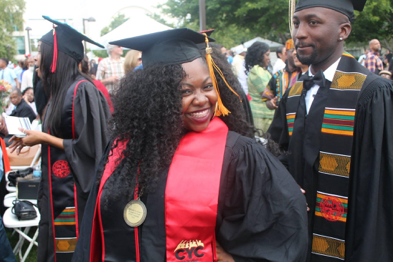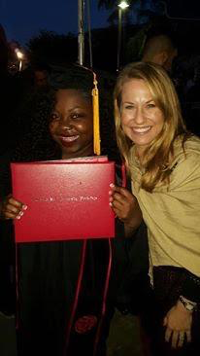Many people who work with the child welfare system know that only three percent of foster youth graduate from college. This means that, despite the number of youth who enroll, most do not finish.
Since exiting foster care I have graduated from Santa Monica Community College and California State University, Northridge, and I will enter my first year at the University of Southern California as a graduate student in social work this fall.
Graduating college is not easy, but I’m going to share my hard-earned secrets to obtaining a college degree after exiting foster care.
To the young adults soon emancipating out of foster care, here are four things I wish I knew about higher education before I transitioned to adulthood, wisdom that I did not hear from the child welfare experts.
College is a different type of hard.
I learned the hard way after foster care that surviving in life and thriving in college requires a different type of mindset and work ethic.
My family urged me to quit school so that I could get a “good job” that would not require me to pay tuition and instead make money. This caused constant doubts to arise each time I struggled with class work.
I was also challenged by new fears. Although I no longer faced life and death situations as I did before and during foster care, common college experiences were also full of their own trials, such as the insecurities that arose when I did not understand my professors’ lectures.
Sometimes I had to deal with a sense of shame after meeting with my professors one-on-one to explain that I had difficulty understanding the course texts or assignments. I also had to adapt to listening to lectures that moved faster than my hands would allow me to write notes.
I felt like everyone had an advantage that I did not have, such as parental support, a childhood of housing stability, lack of traumatic memories and most of all, a person they could trust to share the internal battle of not feeling good enough.
The first time I was enrolled in college at Cal State University Long Beach (CSULB), I struggled hard. I was kicked out because of a low grade point average due to poor grades. But the relationship I had with my godparents, Stephanie and Neil Everett, helped me get back on the right track.
I started again at Santa Monica College, but passing a statistics class was very difficult. After gaining the courage to attend my professor’s office hours for support, I was told that my grade point average in the class was so low that I no longer needed to show up for class. Soon, I was thinking about dropping out of school again.
But my god mom encouraged me to continue to attend my stats class despite my professor’s suggestion. I would soon learn with her support that if I wanted to pass the class, studying would no longer be an option but an absolute must.
I remained in the stats class, keeping the belief that I could achieve my dream of a college degree. To both my god mom’s and my own surprise, I earned a C- in the class, a grade that allowed me to go on to pursue my bachelor’s degree.
Choose the right type of heroes.
I recently thought about who my heroes were in my senior year of high school. My mindset entering my 12th-grade year in high school was to become a stripper. At the time, I thought it would the ideal job choice. It would afford me the one thing I continually lacked growing up, which was money so that I would never have to worry about being hungry or homeless.
My new hero would not arrive until years later, and she would be my guiding light to get me through college.
Stephanie Everett became my tutor, mentor and personal hero. She welcomed me into her family as her daughter. Although I did not meet her until two years after I exited foster care, I consider her my mom, even though she did not come from the neighborhood I grew up in and did not experience the same kind of trauma that I suffered before foster care.
Her “heroic” outfits do not consist of capes or boots. Instead, more often than not, she is dressed in Nike workout gear preparing for a run or marathon. But she has jumped into action to help me out.
Stephanie has used her gift of teaching to help guide me toward many amazing achievements, such as honors society and being a police cadet. From being disqualified from CSULB to becoming an academic scholar, her one-on-one support each day has made this journey no less than amazing.
Trying to navigate life after foster care was difficult alone. Many of the mistakes I made could have been avoided had I been provided a healthy adult who I could trust to ask for help. Re-evaluate your heroes, for they will be the moving force toward positive or negative change.
Build connections with the foster care community outside of school.
While starting out at CSULB, I found it difficult to connect at times to the students around me at school. While many of my classmates talked about holiday trips home and summer vacation trips out of the country, I battled homelessness and spent my time outside of school working full time.
I felt disconnected and alone while everyone else seemed to have some guiding force from family and the financial stability to take adventures. But I realized that the outside community support from foster care organizations changed my college experience and set me up for success at school.
Affiliating with foster care organizations is the way in which I have been allowed to see and hear from youth who have experienced the foster care system and are working toward making a difference.
Whether it is joining a foster care initiative for policy making like the National Foster Youth Institute, job training with The Right Way Foundation or mentorship with Stepping Forward LA, talking to youth with a similar background can help you feel less alone. Being part of a community in the foster care world can allow you to share your thoughts, feelings and obstacles with a community that is built to uplift and surround you.
Sometimes it’s OK to share your foster care status.
After leaving high school and entering college, I wanted to be a different person. I did not want people to know I was raised in the foster care system. I felt as if I told anyone, judgment, ridicule and jokes would be made. Although I knew I had entered higher education, I felt that mentioning my past would bring shame on my present endeavors. So for the first year and a half out of foster care, my status remained a secret.
But sometimes opening up about your time in care can help those around you share support and help you achieve your dreams.
My high school counselors, teachers and my sister told me that sharing my status on my financial aid would allow for grants, scholarships and stipends to be awarded. They were all right! The Shari Walker leaving high school never dreamed she could afford college, but federal student aid through the Free Application for Federal Student Aid (FAFSA) and other financial aid programs offer some opportunities for foster youth.
I know you may have some hesitation after exiting foster care, whether it is the insecurities you felt or wanting to move past what happened before you were 18. Yet your status as an alumnus of the foster care system may open up a world of support, guidance and grants. Most importantly, a lot of this financial support is free money. You may be able to qualify for grants, scholarships and stipends that you do not have to pay back, which will give you a big leg up in covering your tuition, housing, books and additional living expenses while you’re in school.
Yes, college is hard but it is not impossible. No matter how long it takes, you can make it through college to earn your education.
By Shari Walker
Written By Chronicle Of Social Change
Four Things Every Foster Youth Should Know Before College was originally published @ The Chronicle of Social Change and has been syndicated with permission.
Photo by Austin Community College 
Sources:
Our authors want to hear from you! Click to leave a comment
Related Posts








